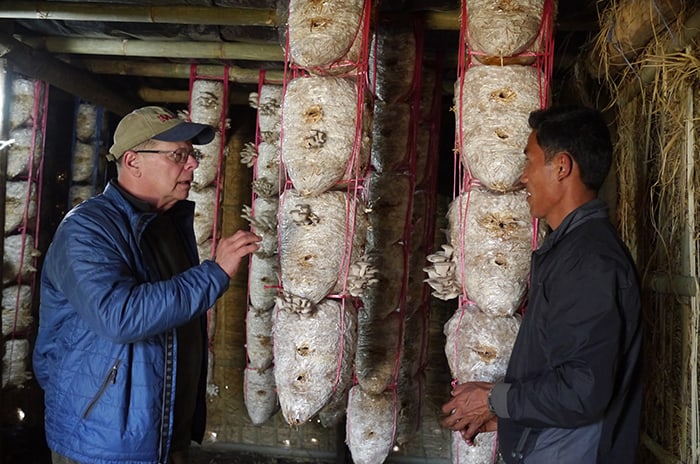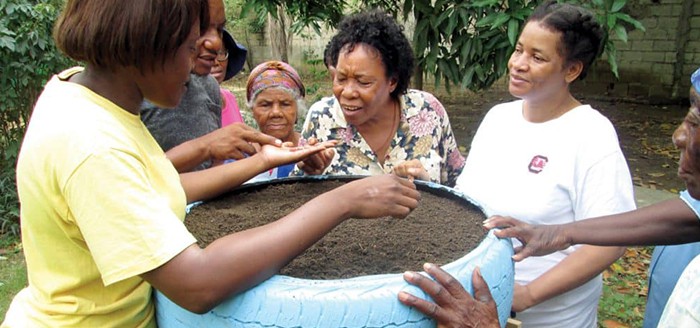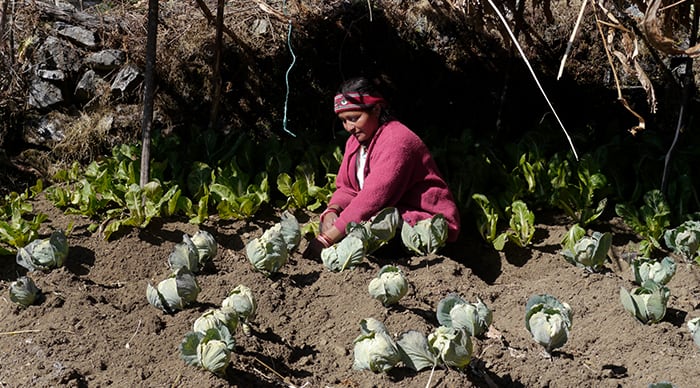By Cindy Wooden, Catholic News Service
ROME (CNS) — Restarting local economies with a focus on providing adequate food for all the world’s people means governments must involve and listen to small farmers and farming families, Pope Francis said.
“Closed and conflicting — but powerful — economic interests have prevented us from designing a food system that responds to the values of the common good, solidarity and the ‘culture of encounter,'” the pope said in a message read July 26 at a preparatory meeting in Rome for the U.N. Food Systems Summit in September.

Maryknoll Father Joseph Thaler (left) talks to cultivator Chinn Dorje Lama in Thimbu, Nepal, where oyster mushrooms are farmed to sustain families in the area. (Sean Sprague/Nepal)
“Our poorest brothers and sisters, and the earth, our common home that ‘cries out for the damage we inflict on it through irresponsible use and abuse of the goods God has placed in it,’ demand radical change,” the pope said. Family farms and other small farming operations are a place to start.
The rural sector of the local and global economy provides so much of the food people consume, but people living in rural areas and working the land are rarely a priority in political and economic decision making, he said in the message read by Archbishop Paul R. Gallagher, the Vatican foreign minister.

Wozlò (yellow shirt) and Herode Laurent, of The Gardens of Hope and Peace, teach community members to plant tire gardens in Cité Soleil, Haiti, where Maryknoll Sister Theresa Kastner supported this gardening project and sports for youth. (Courtesy of T. Kastner/Haiti)
In “the post-pandemic ‘restart’ process that is being built,” the pope said, “small farmers and farming families must be considered privileged actors. Their traditional knowledge should not be overlooked or ignored, while their direct participation allows for a better understanding of their priorities and real needs.”
In addition, he said, “it is important to facilitate the access of small farmers and farming families to the services needed for the production, marketing and use of agricultural resources.”
Pope Francis also asked governments to promote “policies and initiatives that fully meet the needs of rural women, promote youth employment and improve the work of farmers in the poorest and most remote areas.”
A fundamental shift is necessary, he said.

Krishna Maya Basnet tends her kitchen garden at Malemchigaun Sherpa village in Langtang, Nepal, where Maryknoll Father Joseph Thaler supports small-scale, sustainable agricultural projects. (Sean Sprague/Nepal)
The world continues to develop new technologies that increase the capacity to produce food, “yet we continue to exploit nature to the point of sterilizing it, thus enlarging not only external deserts but also internal spiritual deserts,” he said. “We produce enough food for all people, but many go without their daily bread. This ‘constitutes a real scandal,’ a crime that violates basic human rights.
“The careful and correct transformation” of systems of producing and distributing food must “increase resilience, strengthen local economies, improve nutrition, reduce food waste, provide healthy diets accessible to all, and be environmentally sustainable and respectful of local cultures,” the pope said.
“We have a responsibility to realize the dream of a world where bread, water, medicine and work flow in abundance and reach the most needy first,” Pope Francis wrote. “The Holy See and the Catholic Church will place themselves at the service of this noble goal, offering their contribution, joining forces and wills, actions and wise decisions.”
Featured image: Students in Kalifi, Kenya tend their vegetable garden at the Pwani Secondary School for the Deaf, where Maryknoll Lay Missioner Coralis Salvador served as a member of the School Resource Committee. (Sean Sprague/Kenya)

